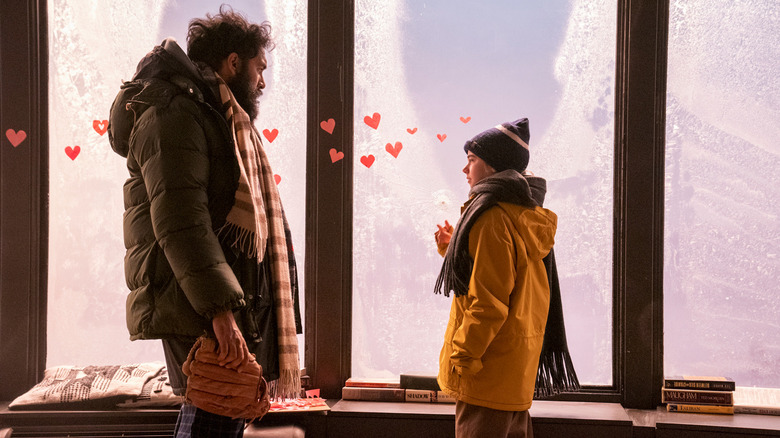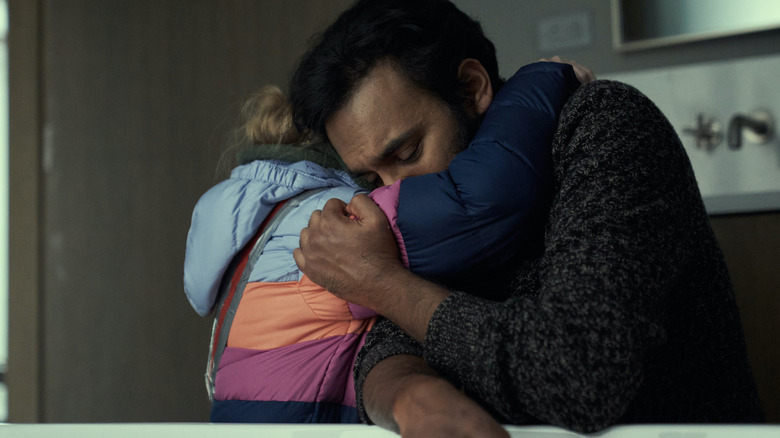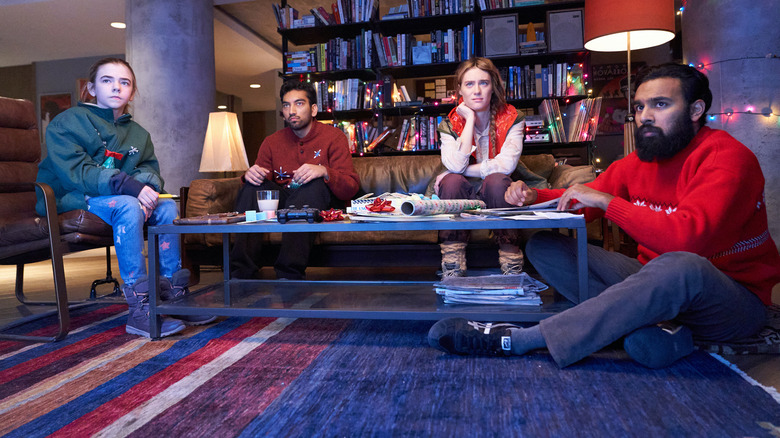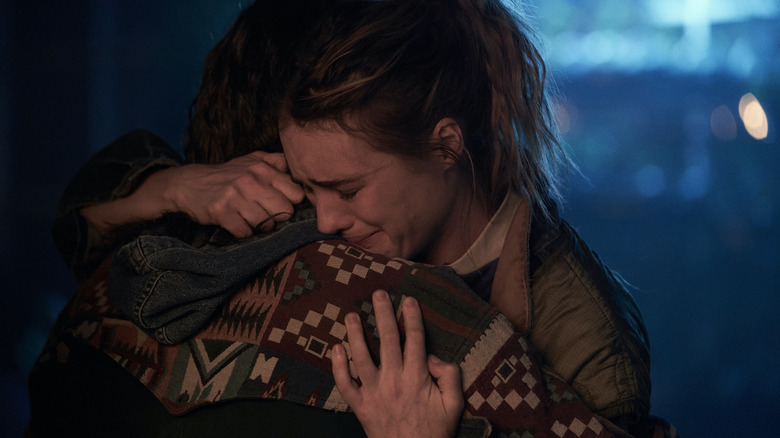If You're Feeling Despair, The Best Possible Antidote Is Streaming On Max
As a writer who often focuses on horror films, I'm sometimes asked by people outside the industry how I process the terrible things I see onscreen. My answer is always the same: horror has become my personal staging site for fear and anxiety. It represents an isolated environment where I can conjure up feelings of deep unease and unhappiness, process them, and then step back in the real world a little more sure on my feet.
But these artistic catharses are not limited to the negative. I also find that there are times when I need art that speaks to the euphoria of being human — stories that find meaning in the darkness and allow me to cling to someone else's optimism for a short while. These are the films and television shows that I return to when I want meaning; not when I'm searching for divine intervention, but when I need characters that reassure me that the things we do actually matter.
So, when I am at those crossroads where I need to feel hope and joy (and pretend, even fleetingly, that humanity's long arc must not always bend towards self-destruction), there is only one work of art that will do the trick. I turn on "Station Eleven" and have myself a good, soul-cleansing cry.
Station Eleven finds life after the apocalypse
For those who, understandably, chose not to watch a series about a pandemic in 2021, "Station Eleven" is a 2021 adaptation of Emily St. John Mandel's book of the same name. The show, which runs a total of 10 episodes, follows a small cast of characters on both sides of a global apocalypse, with one character in particular serving as the focal point pre- and post-pandemic.
Kirsten (played by Matilda Lawler as a child and Mackenzie Davis as an adult) is a young girl starring in a Chicago-based adaptation of "Hamlet" when the show's lead Arthur (Gael García Bernal, seen throughout the series in flashbacks) drops dead on opening night. Luckily for her, that same night Kirsten happens to meet Jeevan (Himesh Patel), a well-meaning stranger who agrees to walk her home from the theater. But by the time the two reach Kirsten's house, word has begun to spread of a deadly flu virus, and one night turns into weeks as Jeevan becomes her reluctant guardian.
For adult Kirsten, however, the world is a much less scary place. Those who survived the pandemic have rebuilt pockets of society, and Kirsten is the star of the Traveling Symphony, a touring Shakespearean company that brings theater and music into the welcoming arms of their neighboring towns. As the two stories unfold in parallel (the now and the then), we begin to fill in the blanks between young Kirsten and grown-up Kirsten, and we soon discover that Kirsten, Jeevan, and a handful of others have been deeply impacted by decisions made long ago.
Station Eleven is a show that refuses to despair
It may sound pretentious to say that "Station Eleven" is a show about being human (technically, all live-action shows are about the human experience), but the before-and-after structure of the narrative puts our basic instincts as a species in the crosshairs. Most films and television shows that present themselves as being post-apocalyptic stories would better be described as apocalypse-concurrent narratives; they are preoccupied with the collapse of civilization, whereas "Station Eleven" is allowed to look at civilization from something of a measured remove.
That gives "Station Eleven" the ability to do something most post-apocalyptic shows cannot do: explore what exists on the other side of grief. In an industry seemingly haunted by the past, where filmmakers and showrunners have learned to use trauma as a SparkNotes version of interiority, the characters of "Station Eleven" represent a more cathartic concept of grieving.
Early in the series, we are introduced to Daniel Zovatto's Prophet, a charismatic cult figure who collects the lost and orphaned children of the world to his orbit. His message is a powerful one for those starting fresh in a post-apocalyptic Chicago. "There is no before," he tells his disciples, not unkindly, and the orphans of tomorrow turn their shining eyes towards him with hope.
As Kirsten takes a special interest in the Prophet, we soon learn that the two of them are more similar than we imagine. They were both young children when the world ended; they grew up without parents, and have made sense of the world through a found family they will kill to protect. But whereas the Prophet has built an entire belief system around his refusal to accept the past, Kirsten is willing to accept the pain if it means remembering.
Station Eleven also finds catharsis in grief
This is best captured in "Goodbye My Damaged Home," an episode where an adult Kirsten — injured and caught somewhere between life and death — is invited by her younger self to relive her final weeks with Jeevan and his brother in Chicago. These are not easy memories for Kirsten to revisit; just a few episodes before, we watched Kirsten falter onstage as she was overcome with memories of her time with Jeevan. But Kirsten knows a truth that will take the Prophet the entire series to admit: there was a before. It was just awful.
On paper, "Goodbye My Damaged Home" could feel too-precious by half. While it's utterly charming to watch Lawler and Davis share a scene together (both actors capture the parallel strength and isolation of Kirsten in heartbreaking detail), the episode could have spun out under the weight of its sightseer conceit. Instead, "Goodbye My Damaged Home" is a devastating hour of storytelling. And not just because we finally bear witness to the fragile brotherhood between Jeevan and Frank (Nabhaan Rizwan). No, what makes this episode so heartbreaking is Kirsten's willingness to endure the pain of remembering.
"Goodbye My Damaged Home" is a reminder that the pain of loss will never justify the act of forgetting. Kirsten would rather live in her pain (both the emotional damage she feels and physical poison creeping through her veins) than deny herself the memories of her loved ones in happier times. That is a transformative concept of grief — not a drowning force that will always pull us under, but as a source of strength that allows us to look our pain directly in the face.
Station Eleven reminds us we are surrounded by lifelines
And so "Station Eleven" finds a reason to carry on, even in the end of the world. In the hands of many contemporary filmmakers, trauma creates the walking dead: characters whose forward momentum will one day end in their own self-destruction. But there is more to grief than helplessness. There is also a call to come out on the other side strengthened by our knowledge that our pain need not be all there is.
And as we dig further into the connection between young and adult Kirsten, we also learn more about "Station Eleven," the comic book that shapes the lives of so many of the show's characters. "Station Eleven" is a comic written for no one (an artistic exercise meant only to satisfy its creator) but because of that, it serves to ground the characters during even their darkest days. Grief into creation, creation into salvation, just when they needed it the most.
That is a powerful message: that art can be a lifeline thrown forward in time, meant to provide comfort to those in search of respite. While the state of the world may feel grim, it is good to remind ourselves that we are already surrounded by lifelines — even ones thrown centuries ago — that can help us process pain and joy in a space that is ours and ours alone. For me, "Station Eleven" is that lifeline, and I am grateful to everyone who had a hand in its design.
"Station Eleven" is currently streaming in its entirety on Max.




